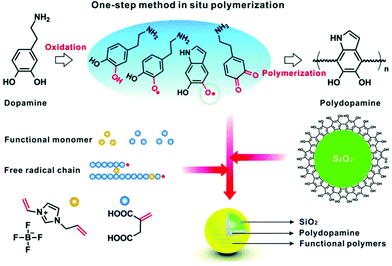Abstract
Inspired by porous smart gel materials, we designed pH-responsive polymer-modified silica microspheres as liquid chromatography stationary phase materials by a one-step strategy. The free radicals generated by the oxidation of dopamine are used to initiate the cross-linking polymerization of functional monomers. At the same time, the good adhesion of dopamine enables the polymer to be modified on silica. The hydrophilicity of this new stationary phase can change in response to the pH of the mobile phase and the stationary phase has weaker hydrophilicity under acidic (pH = 3.78) mobile phase conditions and stronger hydrophilicity under neutral mobile phase conditions. The hydrophilicity difference of the stationary phase leads to the selectivity difference in separation. To evaluate the chromatographic performance of this new stationary phase, 10 oligosaccharides and 9 nucleosides/bases were separated on this stationary phase. This paper will provide good guidance for us to achieve more pH-responsive hydrophilic/hydrophobic stationary phases in the future.

Keywords Plus:STATIONARY-PHASERETENTIONNANOPARTICLESCODEPOSITION
Published in ANALYST;10.1039/d1an01182k,SEP 2021


